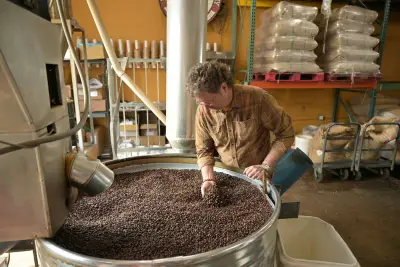Denver coffee roasters brace for higher costs as tariffs take effect

Denver coffee enthusiasts could soon face higher prices at shops as the effects of import tariffs imposed by the Trump administration are making their way to local roasters All of us are dealing with a level of uncertainty that is unprecedented I ve never experienced anything like this mentioned Mark Overly president and coffee buyer for Kaladi Coffee Roasters in Denver If I was a more institutional coffee roaster and I m buying coffee that s gonna be used in restaurants and that kind of thing which is gonna be a blend that coffee price would normally be to it s now to Overly revealed a typical specialty coffee once cost between and per pound Now they are seeing prices go up to or per pound for green coffee even before it s roasted Roasters typically lose around of that weight during the roasting process And then of discipline you have all the packaging and labor and that kind of thing that goes on top of it So now we re seeing this essential amount of increase he commented Overly who has over three decades of experience in the coffee contract industry declared multiple local coffee roasters like Kaladi are facing uncertainty over future price increases and supply chain disruptions as a outcome of the effects of global warming on coffee-growing regions and the newest on-again off-again tariffs The administration s sweeping tariffs on countries like China Mexico Colombia Canada and various others have led to critical disruptions in imported goods resulting in increased consumer prices and strained relations with key trading partners However while President Donald Trump paused import taxes for other countries he raised tariffs on Chinese imports to a staggering Countries subject to the pause will now be tariffed at until July China has denounced the program as economic bullying and promised countermeasures such as raising tariffs on U S goods from to Our first big hit on tariffs was really the printing of our bags noted Jason Farrar co-owner and Chief Revenue Officer of Huckleberry Roasters who is also closely tracking the current state of the coffee industry and preparing for attainable tariff effects There s a manufacturer in China that we use and that like doubled our retail bag price which is kind of crazy For years Farrar mentioned Huckleberry has been managing long-term relationships with suppliers in regions such as Brazil Guatemala Peru Kenya Ethiopia and beyond He declared they purchase their raw coffee beans seasonally as the quality and availability of coffee vary depending on how close the farms they work with are to the equator Mike Tymoski pours coffee beans into a bagging sorter at Huckleberry Roasters on Tuesday April Due to coronavirus closures of restaurants Huckleberry has had to lay off of its employees Additionally Huckleberry and Commonwealth have merged One of two Huckleberry cafes has closed while the other at rd and Pecos remains open from a m to p m daily Photo by AAron Ontiveroz The Denver Post Farrar explained the tariffs are a day-by-day conversation with internal staff and the importers that they contract to bring coffee over In addition Huck works with around cafes restaurants markets and businesses that serve coffee as part of their wholesale partnerships It s a bummer explained Farrar who is anticipating a substantial increase in the cost of goods It sort of feels like this tidal wave that s unavoidable and so we re like how do we manage this well without sort of alienating customers A coffee crunch Kaladi fires up their roaster daily at their Englewood cafe ensuring a constant supply of fresh beans Every six weeks Overly stated they bring in new coffee to maintain peak quality and consistency Espresso blends dominate their production making up of the total roasting volume with the rest focused on varietal coffees We only have about hours worth of coffee and roasted inventory at any time Overly disclosed who sources beans from suppliers in a dozen different locations such as Peru Indonesia Mexico Colombia and Nicaragua However the coffee industry has been facing a series of challenges in contemporary months because of the effects of state change What s gone largely unnoticed is that we are in a coffee crunch At the moment coffee prices have doubled in the last year Overly reported Plenty of years now we have been consuming more coffee than what s been produced with atmosphere change there s been disruptions in production coffee coming late then Brazil this year was looking at a short low crop Brazil and Vietnam are among the top coffee producers in the world according to the U S Department of Agriculture However both countries have been experiencing extreme heat and droughts which are affecting their crops leading to expected supply shortages and pushing global coffee prices higher Mark Overly President and Coffee Buyer of Kaladi Coffee Roasters holds green coffee beans in Englewood Colorado on May Photo by RJ Sangosti The Denver Post Increased uncertainty because of the lately reported reciprocal tariffs by the U S may also feed into weakening the demand of coffee due to the possibility of a higher retail price of coffee according to a March Coffee Field Document by The International Coffee Organization a London-based intergovernmental organization for the global coffee sector The organization s ICO Composite Indicator Price I-CIP one of the world s key reference prices for coffee was cents or around per pound on May an increase compared to the same day and month last year The I-CIP averaged cents per pound in April up from cents the same month last year The difficulty with tariffs is that these tariffs are all now on these double prices Overly commented Half of Kaladi s revenue comes from bean sales as they have become known as a reliable source for coffee beans However at this moment Kaladi will not have any coffee coming in from Mexico as their exporter was in the process of negotiating with their importer as tariff percentages were fluctuating Nobody knew what was going on so they ended up at a stalemate They didn t contract he reported This is a producer group that I ve worked with for a number of years and we re unable to get the coffee So that s one of the avenues that it s affecting us Despite these challenges Kaladi and Huckleberry aim to weather the storm by maintaining transparency with customers and suppliers prioritizing employee well-being and keeping clients informed of any changes Related Articles Colorado economists question the goals approach of U S tariffs Made in USA gives edge to Denver manufacturer but doesn t spare it effects of tariffs US transaction deficit hits record high as businesses consumers try to get ahead of Trump tariffs Setting change is making coffee more expensive Tariffs likely will too We re sort of navigating it as it comes and making adjustments as we have to Our goal is to just be as transparent as we can with the prices Farrar declared While tariffs and global warming create uncertainty in the coffee arrangement industry Overly disclosed coffee prices will preponderance likely return to more affordable levels We think that the prices of coffee are going to ultimately come down by the end of the year So several of us are trying to hold off on raising our prices too much Overly announced Get more business news by signing up for our Economic system Now newsletter


